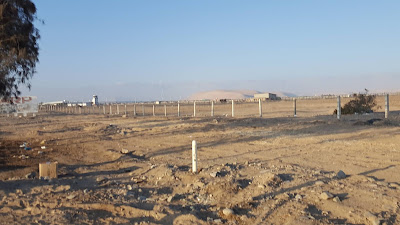Learning to Live Simply: The Battle with Technology
 |
| The view from our bus ride home. |
Almost a full year into my service with JVC, I
look around on my bus ride home and realize I am the only passenger not
looking down at my phone. I have only dusty scenery or people-watching for
entertainment.
All over the planet, we are accustomed
to reaching for our phones unconsciously, sometimes it's the first thing we grab when we wake up. If we want to know what other film
that actor has been in, we open up our web browser. If we feel uncomfortable in
a public setting, swipe, unlock and pretend that something is keeping us busy
enough that we’ve tuned out our surroundings.
One of the values of the JVC community is Simple
Living, which is usually our explanation for why we don’t have cell phones. “We
want to live in solidarity with our neighbors” or “We don’t need the luxuries
of our lives back home”. But technology is cheap. And many members of the
Habitat community and beyond who may have little access to water, food, or
other resources can afford a cheap cell phone or internet plan. In this
current era, living without a cell phone isn’t living in solidarity, it
actually sets us apart and makes it more difficult to get into contact with us on a daily basis.
 |
| Our four year-old neighbor, enjoying the latest app. |
“Why don’t you just buy a chip for your phone?”
Most Peruvians consider our choice to live with
only one old house phone as a weird gringa decision; it definitely
doesn’t bring us closer together. They don’t understand it, but hey, we’re
those JVC volunteers, what can they say? United States associates on the other
hand think we’re out here living in the wilderness and that a functional
cell phone is impossible, which is a problematic misconception in and
of itself.
 |
| Showing off our high-tech cellular device. |
I have discussed at length the pros and cons of
having a Peruvian chip in my phone or getting internet for the house. On one
hand, I acknowledge how useful it would be to communicate and build deeper
relationships with our Peruvian connections. I have lamented the lack of
internet a number of times, wishing I had access for class planning or
resources for my theatre class. On the other hand I see the value in being
“unreachable”, not as an act of solidarity but as a choice to be present and
engaged with our life here in Tacna. It would be so easy for me to curl up in
bed with Netflix or to scroll through endless posts on Facebook as I wait for
the bus, instead of looking up and seeing a fourth-grade student from my school
waving at me with a giant gap-toothed grin.
This music is wonderful although I sometimes find it hard to hold full discussions when it's blasting overhead.
 |
| Our cell phones serve a variety of purposes: alarm clocks, yoga teachers, and 'professional' cameras (with a journal and rocks as our high-tech tripod) |
The values of my volunteer community here in
Tacna have forced me to remain in reality and accept feelings of discomfort and
awkwardness. Picture this gringa struggling to find a conversation
topic, too tired to conjugate any verb in Spanish, and some very loud cumbia or
chicha music blasting overhead. I can’t just pull out my phone and text “God,
this is awkward” to a friend as a form of escape. Through all of these
‘cringeworthy’ moments, I’ve found out something not so surprising: it feels
good to be present.
It’s not just the awkward moments I live
through, but the moments of joy and delight. It’s being present to my nine-year
old neighbors who come knocking every Monday afternoon, spotting some new,
hilarious event out the window of the bus, taking time to sit down and have a
full chat with a friend from home — that for me has been one of the most
impactful parts of living simply: my relationships in the U.S. aren’t governed
by mindless texting back and forth. When I want to talk, I need to sit down and truly listen to the conversation.
Going two years without a functioning cell phone
may be an extreme choice. I have debated internally about access to internet and how that will affect my ability to plan for the future. I know I won’t continue when I finish this program,
but I hope that in the meantime I learn how to live in this world without my
little Samsung brick as my best friend. I hope I use those extra minutes given back to me, when I’m not looking at a screen,as an opportunity to build routines and
rituals that keep me healthy, happy, and present to the experience life.
 |
| Taking a walk in the calm afternoon light. |



Comments
Post a Comment